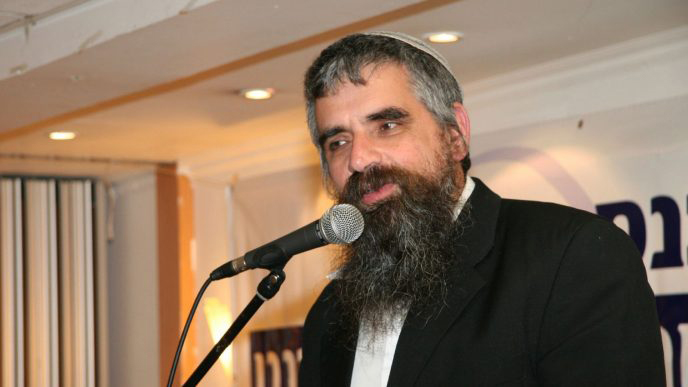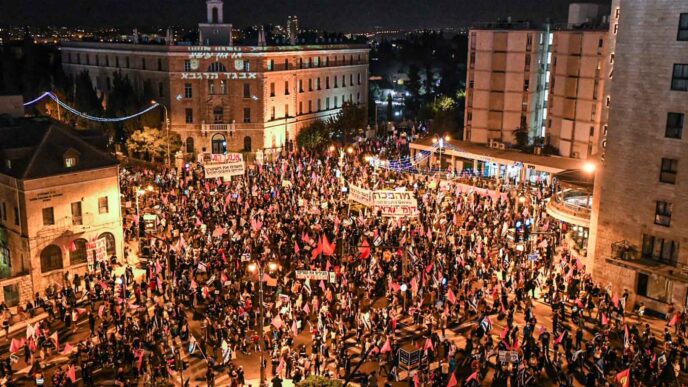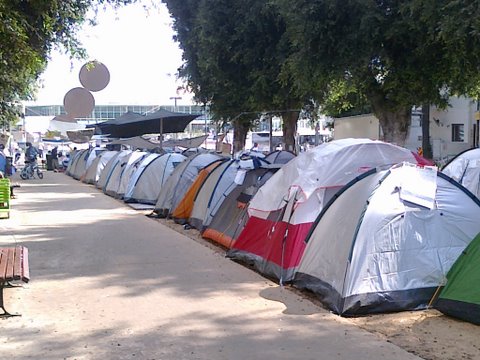
The relationship between the ultra-Orthodox and the state of Israel is heading in a positive direction. They are going to work, using the Internet, and all this without losing the ultra-Orthodox identity," says Rabbi Yuval Sherlow (62).
As a Religious Zionist, and as an expert in medical ethics, he is a member of a committee that approves innovative ways of treating the corona virus, and he has not lacked criticism of the conduct of parts of the ultra-Orthodox public during the pandemic. However, he insists: "The state needs to be magical enough, to be a magnet for such processes. Change will not work by force."
What is actually happening in the ultra-Orthodox public?
“Today, one cannot talk about the ultra-Orthodox as a monolith. Some ultra-Orthodox streams see the pandemic as a unique opportunity to differentiate themselves. They have a great deal of anxiety about the process of 'Zionization' and modernization they are going through.

"One characteristic of modernization is the penetration of the Internet, which until today they had struggled against successfully, but now it has failed. And the other thing is the adoption of Israeli customs. These are processes of Zionization, of assimilation into the wider culture.
"Right now there is an opportunity, for those who want it in the ultra-Orthodox community, to say 'No!' to the state: 'We make decisions for ourselves, and maybe also for the state'. To try to go backwards. There is no place in the ultra-Orthodox Jewish worldview to legitimize the secular government, to allow the government to make meaningful decisions. Decisions on where to place a sewer line, okay. But the secular state has no authority on decisions in the field of values as far as they’re concerned.
Is deciding on the proper distance while gathering during a pandemic so different from deciding where to lay a sewer line?
"If this decision requires that certain celebrations be skipped, then the statement is that with all due respect, it isn’t your decision. You will explain the level of risk, and the Rabbi will decide if it is worth the risk. After all, we always take risks. And if the closure of the yeshivot is crucial to us, then we are ready to take a risk."
Sherlow was one of the few right-wingers who took part in a demonstration held in Tel Aviv at the end of 2017, against government corruption. "We're in danger of losing faith in decision-makers," he said at the time, asking the crowd, mostly secular, "if we need an economic plan how will we know it's for the good of the people? How will there be trust when we have to go to war?"

In light of the distrust expressed by many towards the government's policy in the war on COVID-19, his remarks are very timely. In recent months, his name made headlines when he spoke out against the arrest of ex-general Amir Haskel during an anti-Netanyahu protest.
"The battle against opponents of the government endangers us," he wrote. According to the Rabbi, one of the things that can build trust across ideological camps, is fairness. "Right-wingers should ask themselves whether they opposed police violence even when it was directed at the Arabs. Left-wingers need to answer whether they opposed police violence even when it was directed at settlers. A fair and decent dispute is more allowing"
When you look at Israeli society today, what do you see?
"I see something that goes beyond a passionate disagreement, to a rupture. I love disagreement. I would almost say I make a living from disagreement. If there was no disagreement there would be nothing to teach in the Gemara [Talmod]. The word disagree is a good word. Controversial subject? Excellent. There’s something worth saying.
Right-wingers should ask themselves whether they opposed police violence even when it was directed at the Arabs"
"Disagreement becomes rupture when the parties begin to think that not only is the other side wrong, but that it is illegitimate. In the debate between the right and the left we have reached a situation where in some parts of the right the position of the left is perceived as illegitimate, and vice versa. Once a society reaches the point where one side sees the other side's position as a crime, as a sin, not as a mistake, then the disagreement stops being worthy and becomes a division.”
How do you recognize the transition from disagreement to division?
"The parties cannot find even one good word to say about each other. Publicly, once you say that something is leftist – it becomes illegitimate in the eyes of the right, a derogatory word, and the same thing on the opposite side.
"Personally, when I argue with someone the first thing I check is how he presents my position. If he presents it fairly and honestly, and then disagrees with it, attacks it, it's legitimate. But if he presents it in advance in a manipulative way, this is the best indication that it is a division, that there is no point in having a disagreement.

"I think in real life the situation is better than in public discourse, but these are the voices that we hear. It brings us closer to a rupture, and it does not allow people to see things differently, because you will not change your mind by debating with an illegitimate position. Rabbi Kook said that the fact that we think that our brain will be able to contain the whole truth is stupid, childish. "
Each side claims that the other side has crossed the line. How do you know where an idea crosses the line?
"I'm not sure I know how to set the boundary, and it may be that the boundary cannot be set. And then, we may be descending a terribly slippery slope with no way to stop. In history there have been too many processions that couldn’t be stopped. And then the decision is made by force. Whoever is stronger decides.
"If the situation is that everyone really sees the position of the other side as a demon, a devil, then only the language of power remains. Historically, many disagreements have been resolved by blood, when one cannot agree on at least a technical way of deciding.
"One of the beautiful questions associated with Simchat Torah is why we dance with a closed Torah scroll, without being able to read its contents. One explanation is that regarding the contents, we disagree. I will read it in this way, you will read it in a different way. When you dance with a closed scroll you make it clear that the dance Is for everyone.
"But the world I'm talking about is not postmodern, in the sense that everyone is right. I'm right, he's right, she's right. Something that makes everything meaningless. I do think there is greater power, greater light, in certain positions. And in the end it has to be decided. And I am a man who hands down my decisions, but they do not cancel entirely the desire to acknowledge points of truth that exist on the other side."
"Judaism has not yet dealt with a state as our state"
The harm of COVID-19 is not just medical. The economic consequences of the epidemic are provoking sharp debates around the world, and in Israel as well, on questions of just economic policies. Ideas that once sounded radical, are being seriously considered in conservative economic institutions and concepts that were not known to the public are becoming public domain. And yet, in the public Sherlow comes from, Religious Zionism, there is almost no real interest with issues of social justice.
"Many years ago I wrote an article in the journal 'Nekuda'," he recalls. "I tried to explore the fact that most of the charitable institutions are religious, even those that serve all residents of the country, Yad Sarah, Ezer Mizion, etc.; and on the other hand, the vast majority of institutions for justice, Kav LaOved, Association for Civil Rights, etc., are secular."
Does the practice of charity replace the discussion of economic justice?
"In the religious language, when it comes to social justice, we talk about running programs for children in hospitals, not about a struggle for workers' rights, or against delayed payment of wages. I am noticing that amongst the major voices in the religious Zionist world, the general policy is becoming more and more right-wing: Kahelet Policy Forum [Neoliberal think tank] as exemplified by Ayelet Shaked and Naftali Bennett. The socialist voices, like Shaul Yahalom and Zevulun Orlev, were thrown out of the political system.

"The language is very right-wing when it comes to the state economy and the language of solutions to distress in the community, is that of kindness and charitable giving. Here and there people deal with issues of social justice, but real religious socialism? I do not know of even one prominent advocate of it at present.
"It has to do with broader, deeper questions. In general, Judaism has not yet dealt with questions of the state. The state emerged too quickly for Jewish thought to catch up and think through it."
When dealing with a 'Jewish democratic state', we usually talk about the relationship between 'Jewish' and 'democratic'. You’re saying, we need to talk about the relationship between ‘state' and 'Jewish'?
"Absolutely. I will give you an example of a huge debate, which is occurring in one of the groups of rabbis I am a member of. A man arrested for a crime he didn’t commit. By mistake. He was suspected of murder, placed in custody, and on Friday night it is discovered that he is innocent. It happens. But it takes desecrating Shabbat to release him from prison. Is it allowed?
"Now, I'm not talking about hiding behind claims like 'maybe he's suicidal then it's pikuach nefesh (saving a life).' No. I'm talking about a religious ruling that says a state cannot deny liberty, on a level that it precedes the importance of Shabbat. This is just one example. Judaism has not yet made a sufficient leap forward in relation to these questions."
Is this also reflected in the attitude of religious Zionism to things like the anti-Netanyahu demonstrations?
“My contention, and I have been making it since I participated in that demonstration for about three years, is about harming state institutions. But in parts of the religious world, this harm is considered welcome. It is not only the High Court that the anti-state religious hate. It’s the police as well, and more. But structurally, without taking a position on what should exist, we have a state without a budget, without a police commissioner, without a state attorney. We have a government which can not function structurally, let alone in terms of promoting values. It's a problem.
"So within this reality, each disparate group is clawing for its share of the additional 11 billion shekels [that was added to the budget for COVID-19], and that's it. This is a diasporic approach that is suitable to the Shtetl. An approach that does not deal with the desired structure of an entire state."
How do we get out of it?
"I do not know. I think that the situation is better than it might seem. That there is a huge mainstream that is willing to break out of it. Center, left, right. Also in relation to the Palestinians. If I put aside the question of trust and talk only ideology, then if there was a 'deal' ready to be made, 80 percent would support it.
"There are mainstream people who want coexistence, who do not paint the world in black and white, who live not only on Twitter and on social networks but in real life. Who are tired of the current form of leadership. Who are willing to accept something else even if it isn’t from their party. In this sense I have great optimism in my reading of the situation.
"But in principle, the more voices that refuse to enter their given positions. The voices who embrace a culture of deep disagreement. The more resonant the voices that ask themselves 'how far am I willing to go without losing the foundations of my existence?', the more truly blessed things can happen. That's the way I can think of to get out of this."






